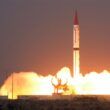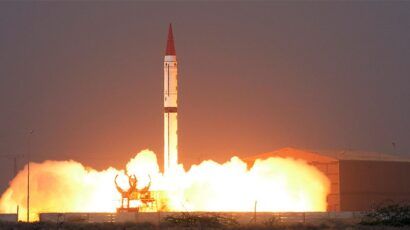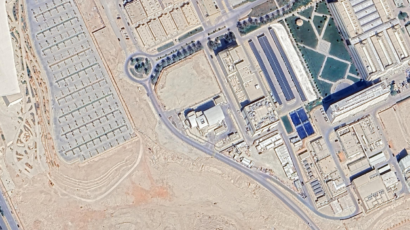Missile defense in the eye of the beholder
By Liviu Horovitz, September 26, 2014
Fortunately, only limited empirical evidence is available regarding nuclear weapons' effectiveness as instruments of foreign policy. This means that assessments of nuclear policy are grounded deeply in theory—and that one's views on missile defense are heavily influenced by theoretical assumptions.
But views on missile defense also depend on personal allegiances. I am a native of Romania, a second-tier US ally in Europe, so I will tend to support viewpoints that align with the interests of Romania and similar nations. I will judge theoretical approaches to missile defense in light of their implications for my own country. I believe debates over nuclear weapons and missile defense can best be understood within frameworks that emphasize disarmament, stability, or national supremacy. Which aligns best with my own allegiances?
The disarmers. Advocates for disarmament come in at least two varieties—those who reject nuclear weapons' ability to deter and constrain, and those who accept it. People in the first camp dismiss the idea that nuclear weapons can allow cooler heads to prevail. They believe instead that nuclear weapons are bound to cause miscalculation and war. Though missile defenses could potentially be used to enforce compliance in a denuclearized world, people in this first camp believe that missile defenses only distract from abolition efforts and render an already unstable world even more dangerous.
The second camp accepts the idea that nuclear weapons perform a restraining function, but believes that this benefit is outweighed by associated risks like accidental use or nuclear security hazards. Most who hold this viewpoint, though they might once have hoped to reform the current global security architecture in order to enable disarmament, have abandoned this ambition. They now hope that nuclear-armed states will recognize the risks inherent in weapons possession and proceed toward abolition. In such a scenario, conscientious governments might cooperate to establish a global missile defense system that would make nuclear-armed missiles obsolete. Thus the last nuclear holdouts could be persuaded to disarm.
At first glance, disarmers' arguments are appealing. Any use of nuclear weapons would surely have catastrophic consequences for the whole world. But with much of the planet relying on nuclear weapons for security in one way or another—and with no serious discussions under way to reform the current global security architecture—abolition remains little more than pie in the sky, no matter how desirable a goal it might be. So missile defenses must be assessed within the competitive international system that currently exists, not within a hypothetical world of enlightened governments. There is little reason to believe that any state would give up its hard-won advantages in missile defense technology or acquiesce to a truly cooperative system.
Stability seekers. The theoretical approach of stabilizers, meanwhile, is characterized by valuing the status quo and seeking to maintain it in perpetuity. Stabilizers abhor interstate conflict. They contend that in a nuclear-armed world, it is more imperative than ever that all nations employ military force only to ensure their physical security from foreign aggression. Stabilizers aim to prevent security dilemmas and thereby help avert wars. Some stabilizers would welcome nuclear abolition but assess the current prospects for disarmament as gloomy—they hope a step-by-step process will produce the desired result. Other stabilizers accept the notion that nuclear weapons are generally stabilizing, and they are willing to live with the weapons' inherent risks. But all stabilizers disapprove of challenges to the current international order.
According to stabilizers, missile defenses are both pointless and perilous. They are pointless because the overwhelming conventional and nuclear capabilities of the dominant states can deter proliferators from adventurism. Though emerging nuclear powers can inoculate themselves from invasion, they cannot coerce others into submission; they know that launching a nuclear attack would invite overwhelming punitive action. Missile defenses are perilous, meanwhile, because they can destabilize relations among great powers. If a nuclear power fears that most of its missiles could be destroyed in a first strike and the remainder intercepted by missile defenses, it will build a larger arsenal and develop its own defensive capabilities.
Stabilizers'arguments seem very reasonable from the perspective of second-tier US allies in Europe. These countries have benefitted from an unassailable US security umbrella. The resulting peace and predictability have allowed economic growth and relative prosperity. The adventurism of new nuclear powers far from European shores seems a manageable problem to nations such as Romania. It is conflict between great powers that seems threatening to them. Admittedly, some of the tension between the United States and Russia concerns missile defense. But missile defense may be only a symptom of larger disagreements between the two nations. If that's the case, banning missile defense would achieve little. US-Russia tensions would simply erupt in some other arena.
Supreme interests. Supremacists, on the other hand, are focused on furthering the well-being of their own nations by all means available. They see the world as something to be made secure for the pursuit of their interests. Stability is valuable if the status quo happens to be favorable—but if it is not, circumstances can be adjusted through the exercise of power. Though the toolbox of power contains many instruments, the ability to menace others is paramount. Tinkering with military power in a nuclear environment is surely dangerous, and an escalatory spiral is always a possibility. Supremacists, however, are comfortable leaving something to chance.
To supremacists, missile defenses are therefore useful. To be sure, stronger states can usually deter weaker nuclear states from reckless behavior. But if the preferences of dominant states collide with the fundamental interests of weaker ones, the result is an imbalance in stakes that might prevent the powerful from strong-arming the weak. A reasonably well-functioning missile defense system could provide the antidote to this problem. It would render uncertain the weaker state's ability to strike the stronger one and—along with the stronger state's ability to inflict colossal punishment—would strengthen the coercive hand of the mighty. Though missile defense might distress other great powers, it can also force them to divert scarce resources to safeguarding their nuclear deterrents. This will weaken their power in other areas.
Supremacists' arguments seem unworthy of support (except perhaps for citizens of supremacist countries). Still, from a Romanian perspective, the current US-dominated international order is very positive. However, it seems a daring bet to assume that the current international order—so favorable for my own interests—can be maintained in perpetuity without conflict. A global economic realignment is under way, and rising powers will soon demand their place in the sun. What is the best way to ensure that any transformation away from the current order is slow and non-disruptive? Will reliance on military prowess enable such a transformation, or will it only lead to war and destruction? This is a crucial question.
The current missile defense deployments of the United States are limited and toothless. Yet they serve the interests of US allies well. They represent an American trip wire, one that reassures elites in many countries that Washington is guarding their security. Whether the deployment of full-fledged defenses would further or harm the interests of US allies remains hard to tell. Then again, considering the poor performance of US missile defense in many recent tests, such full-fledged defenses might never become reality.
Topics: Nuclear Weapons
Share: [addthis tool="addthis_inline_share_toolbox"]














